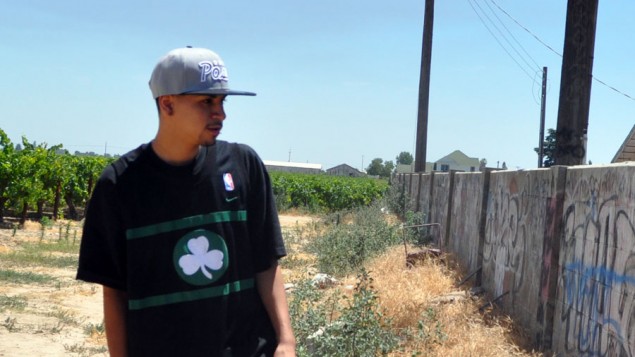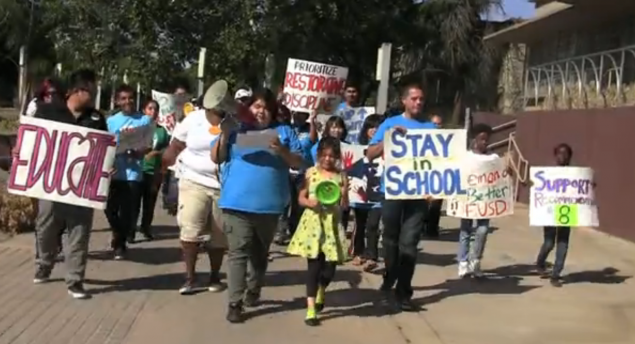
Through working with VORP (Victim Offender Reconciliation Program) and SUCCESS (Students United to Create a Climate of Engagement, Support and Safety), we’ve created a story series to be featured in The Fresno Bee. This series was produced to portray the mission of VORP and SUCCESS in partnership to create a school climate that supports youth staying in school and lowering drop out rates in Fresno.[/box_light]
Fresno looks at restorative justice program to aid students, defuse powder-keg schools
“Peace Land,” they call it.
They know it’s an impossible task.
“We’re actually dreaming,” said Eric Butler, a counselor who teaches the class, “because most of our kids have been taught to stop dreaming.”
This is Oakland Unified’s Ralph Bunche High, a last-chance continuation school where most students have spent their short lives in and out of school and jail, battered by the violence and poverty that surrounds them.
The exercise is part of Butler’s conflict mediation class, one component of the school’s restorative justice program that has reduced suspensions by about 50% in the past couple years. Restorative justice is a process that works to improve student behavior through mediation and building trusting relationships between adults and kids.
This year, Butler is determined to have zero suspensions. Never mind the iron bars across the windows, security guards blocking the school entrance and police officers who stroll the hallway. Never mind that on this Tuesday morning after Labor Day, students came to school with stories about who they beat up, who beat them up, the drugs they did and the drugs their parents did over the weekend.
“We don’t have a kid problem, we have an adult problem,” Butler said. “We should feel bad about it enough to do something about it.”
Oakland Unified’s restorative justice program has gained national attention after suspension rates dropped by 40% at some schools and almost 90% at others.
Oakland Unified passed a 2010 resolution supporting restorative justice and began working with nonprofit Restorative Justice of Oakland Youth to get programs off the ground. Butler, who works for RJOY, is among the counselors who have helped start programs at 13 schools.
Fresno Unified, in its own effort to repair chronically high dropout and suspension rates, has paid close attention. Fresno may be ready to dream up its own “Peace Land.” Read more
[divider]First-person: Caught tagging, he now cleans graffiti
[dropcap]M[/dropcap]y name is John Alex Pena. I’m 19, I’ve got five siblings and I’ve got a mom.
I grew up my whole life in Fresno.
The first time I got in trouble was freshman year. I had like 40 Sharpies in my backpack. The principal saw and put me in the opportunity class, for problem kids. That is when it all changed. Read and watch the rest of this story.
[divider]Fresno Unified students aim to remake school discipline

This youth team called itself SUCCESS (Students United to Create a Climate of Engagement Support and Safety), and we did a tremendous amount of research over the past few years. Read the rest of this story.
First-person: ‘Why did I have to mess up so badly?’
[dropcap]M[/dropcap]y name is Jane Carretero and I am 14 years old. Towards the beginning of my 8th grade school year at Fort Miller I started doing drugs, and my mom found out about it.
One day, she and I got into a huge fight and she found a bottle of marijuana in my backpack. It was a difficult choice for her to make, but she ended up calling the police. They ended up taking me in for that. Read and watch the rest of this story.
